
by Jennifer Burden | Apr 14, 2014 | 2014, World Moms Blog, World Motherhood

There’s a Bigger World Out There
When I was a toddler back in the 1970s, my favorite toy was a wind up pocket radio box that played “It’s a Small World”. As the music played, it turned the little children from all around the world dressed in different clothing past my eyes. I remember, as I grew, constantly asking my parents, “Where is this girl from?” and “Where is this boy from?”, while pointing to the toy. My mother even saved the radio for my own kids to play with.
Fast forward 30-something years later, and here I am, learning everyday on the topics of motherhood, culture, human rights and social good from the women around the world who write for World Moms Blog. I am lucky to be raising my children virtually with Tinne in Belgium, Susan Koh in Singapore, Tara B. in the USA, Nancy in Tanzania, Deborah Quinn in the UAE…and the list goes on!
And that little Disney radio box was one of my first indications that there was a greater world outside of my own suburban NJ neighborhood.
The #DisneySMMoms Conference
This past weekend I had my bags packed to head to the Disney Social Media Moms Conference, this year in Disneyland in California. What luck that it was going to be during the 50th Anniversary of Disney’s It’s a Small World! I excitedly checked into my flight…only having to call the airline and uncheck myself from my flight hours later because my kids, and at the very last-minute, my husband, fell sick. Taking care of the family is what, us, parents do, right? So, how to turn lemons into lemonade? We asked the World Moms Blog Contributors to send a photo in to be part of a special slide show where our site could commemorate Disney’s It’s a Small World 50th Anniversary. On such short notice, take a look at what we came up with…I can’t stop watching it!!
VIDEO: Happy 50th Anniversary It’s a Small World from World Moms Blog Contributors!
Disney and UNICEF
And, if you’re a regular here, you know how much we love UNICEF when we chose them as our beneficiary for our Live Below the Line campaign. I’ve also traveled to Uganda to observe UNICEF’s programs on the ground firsthand with the UN Foundation’s Shot@Life campaign. It makes me happy to know that Disney has pledged to donate $150,000 to UNICEF to commemorate the 50th Anniversary of It’s a Small World. You can join in, too. Build your own doll or record yourself at SmallWorld50.com, and for every doll, one dollar will be donated to UNICEF by Disney. This is an original post to World Moms Blog by Jennifer Burden of New Jersey, USA.

Jennifer Burden is the Founder and CEO of World Moms Network, an award winning website on global motherhood, culture, human rights and social good. World Moms Network writes from over 30 countries, has over 70 contributors and was listed by Forbes as one of the “Best 100 Websites for Women”, named a “must read” by The New York Times, and was recommended by The Times of India.
She was also invited to Uganda to view UNICEF’s family health programs with Shot@Life and was previously named a “Global Influencer Fellow” and “Social Media Fellow” by the UN Foundation. Jennifer was invited to the White House twice, including as a nominated "Changemaker" for the State of the World Women Summit. She also participated in the One Campaign’s first AYA Summit on the topic of women and girl empowerment and organized and spoke on an international panel at the World Bank in Washington, DC on the importance of a universal education for all girls. Her writing has been featured by Baby Center, Huffington Post, ONE.org, the UN Foundation’s Shot@Life, and The Gates Foundation’s “Impatient Optimists.” She is currently a candidate in Columbia University's School of International and Public Affairs in the Executive Masters of Public Affairs program, where she hopes to further her study of global policies affecting women and girls.
Jennifer can be found on Twitter @JenniferBurden.
More Posts - Website
Follow Me:


by Karyn Wills | Apr 14, 2014 | 2014, Awareness, Being Thankful, Brothers, Communication, Family, Kids, Life Lesson, Motherhood, New Zealand, Older Children, Parent Care, Siblings, World Moms Blog, World Motherhood

The author with her three boys
When my boys were small, it was easy to find ways for them to nurture. They all had dolls and stuffed animals to care for and I tried hard to let them hug me whenever they wanted, even when it was really inconvenient or awkward, or snotty, or tiring for me.
But it got harder, when they got older. Dolls gave way to LEGO and cars, then Nerf guns and Minecraft. Time away from me at kindy or school, or play-dates or sport, meant the hugs, while no less enthusiastic, were less frequent. I realised I had to be more lateral in seeing their nurturing: Life had changed and they had grown beyond my initial, pre-baby, plans and ideas.
It came to me in a flash of understanding, a few weeks ago, how much their being in service to me, is their way of nurturing and this is what I now focus on, for this part of their growth and development.
The times when they tell me to sit on the sofa and do nothing, I need to listen to them and do as they wish. And while I have always accepted their offerings of daisies and dandelions picked from the lawn and scrunched in tiny hands, I now have to accept them pouring my wine and cooking my dinner – without my input.
The times they volunteer to do these things, I need to keep my directions to myself and my appreciation flowing – despite my discomfort at sitting still while they work and despite the painful slowness with which they perform these tasks.
I have also learned to accept them opening doors for me. They do this not because they think I can’t manage to do so for myself, but because it’s a way they can show me that they care for me.
And I accept their offerings, not because I think I deserve this gesture because of my gender, or my age, or my position as grand dame in their lives, but because I see it for what it is: Nurturing of me, and something to be valued and encouraged.
Apologies have also become a point of nurturing. In our house, they are seen not as just social niceties and empty words, but as a starting point for repairing a battered emotional bond. After an apology-needing moment they almost always ask, “How can I make things better?” And are wonderful at showing they really do mean their words via their actions. They nurture their relationship with me, as I do with them.
No, they aren’t angel children who do these things all the time. They still need direction and they can be down right horrid. They are often disorganised and they are often messy, noisy and silly. But they do show their ability to nurture in a variety of ways. I just have to look at their actions from a different perspective, and accept their gestures as signs of the loving emotion behind them.
How do your children show you they care?
This is an original post to World Moms Blog from our writer in New Zealand and mother of 3 loving boys, Karyn.
The photograph used in this post is credited to the author.
Karyn is a teacher, writer and solo mother to three sons. She lives in the sunny wine region of Hawke’s Bay, New Zealand in the city of Napier.
More Posts

by Purnima Ramakrishnan | Apr 11, 2014 | 2014, Brazil, Human Rights, Humanitarian, Humanity, Purnima, Social Equality, Social Good, The Alchemist, World Moms Blog, World Voice
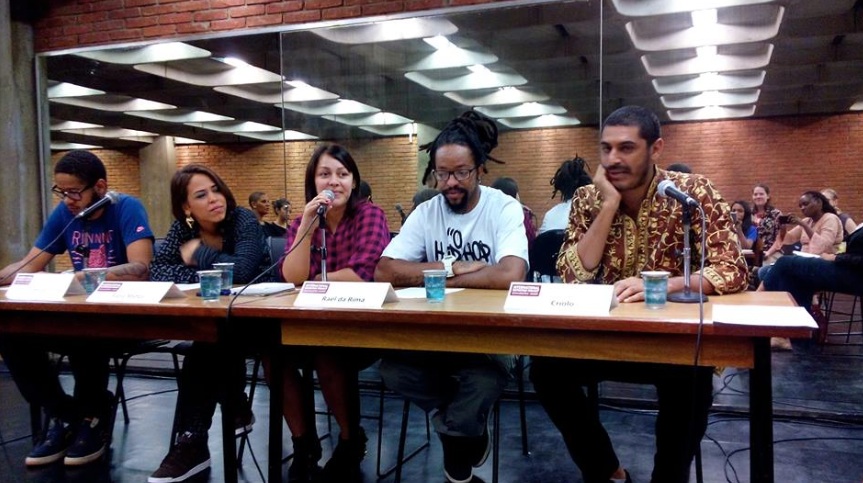
Centro Cultural Sao Paulo
Our visit to Sao Paulo with The International Reporting Project was coming to a close. After a very hectic day of Community heath visits and chatting with doctors, nurses, and community health workers, we just had to do something very cool. And what nicer thing than to rap our way into it?
We met the awesome International acclaimed Brazilian rap group at Centro Cultural Sao Paulo, and it was a great honor to be in their presence.
In the 1990s a musical style known as rap consciencia (socially conscious rap) originated in Brazil. These days it is making huge waves and improving the lives of people by making them socially conscious of their choices, their lifestyles, rights, issues, and gently coaxes them to dream of things which generally are taboo to dream about, for the Afro-Brazilian ethnicity.
Criolo was 11 years old when he started writing lyrics and now he has chart busters in London, New York and Paris. At the tender age of 11 he wrote about social issues. Social inequality is a major problem in Brazil. There is still prejudice across Brazil.
Criolo said, “there are so many ways to live. To wake up, to eat, to get to work and then get some money and then to eat again, is one way. If that is to live, it means people sell themselves for some food and money. That is just a process. Stop it. Live life. Let us talk about ourselves, our passions and aspirations and our joys.”
Rael da Rima was 11 when his music band used to talk about social injustice, racism, and equality to all. He talked a little bit about his personal life, and how rap music changed his life, and the lives of people living around him.
He said, “I give you an analogy for the social inequalities in Sao Paulo. Some people use this mineral water (indicating the drinking water on the table) to wash their BMW cars, and yet some do not have access to clean drinking water. Sao Paulo is a city of extreme contrasts. I sing so that people consciously become aware of their own lives and strive to improve it.”
Rael singing of his passion for rap music:
Emicida says, “When I was young, to get into college was not something youngsters would think about. Just to let the day go by was an accomplishment. Nowadays when I walk through the favela(slum) I grew up in, I am so happy to see the youngsters talking about their dreams of being in college and to get a ‘real’ job. When slavery was abolished, it was both a curse and boon. A curse because people were pushed into poverty and violence with no support system, a lot of confusion, and no real understanding of what was happening in society or the political and economic scenario of the country. My rap is to inspire people to talk about their dreams, how to get out of social inequalities and to be truly free. In everyone there is a human being and I wish for each one to know it. Through rap music, the magic of communication is established, and people are inspired to know themselves as such.”
Emicida singing for World Moms Blog
Flora Matos was 18 when she decided to move to Sao Paulo from Brasilia. She sings so people are free of sexual prejudice. She says her music always speaks of love – love for all kinds of people – love for humanity as a whole and breaking anything which could make people hate each other.
Flora Matos singing of love – love for people, passions, and love for all of humanity
These musicians and others like them are not people who sign on big labels or crave all of the fame and popularity. They just want justice, recognition of the minorities as human beings, and some peace for their community. And they do it through rap music.
They sing about poverty, prejudice, abuses of various types, about the blacks and whites in Brazil, and the classes. Flora said, all her numbers are characterized by experiences, either her own, a friends or someone she knows about. So this idea of communication which Emicida says – that is the magical bond – is established. This communication through music is not just passing of information or ideas or activism – it is an expression to bond humanity, a gentle prod to awake, and be aware. So through the actual performance the listeners carry back this vital element of being part of the movement.
So even though they do not directly change anything, or may not be able to give statistics and figures, they change attitudes, and invest in developing agents of change – which is a very vital thing to forge a developing society, progressing towards success.
I am not a big fan of music, not even Indian music, but that day I promised Criolo I would look him up on Youtube. He was mildly surprised to know that I came for a meeting with rap artists when I was not into music at all. I explained that it was because I learnt they worked for social causes through music, and I was interested in that. He wished me luck and said he would look up World Moms Blog too and we parted.
Just for fun, I also recorded some street musicians the other day in Sao Paulo’s Avenida Paulista, one of the poshest locality in Sao Paulo. I cant help sharing the below one.
This is an original post to World Moms Blog by Purnima Ramakrishnan, our Indian mother writing from Chennai, India. Her contributions to the World Moms Blog can be found here. She also rambles at The Alchemist’s Blog.
Photo credit to the author.
Purnima Ramakrishnan is a fellow of Journalism with the International Reporting Project (IRP), reporting from Sao Paulo, Brazil. Follow on Twitter at #BrazilMDGs

by Mama B (Saudi Arabia) | Apr 9, 2014 | 2014, Family, Husband, Kids, Life Balance, Marriage, Parenting, Saudi Arabia, Working Mother, World Moms Blog
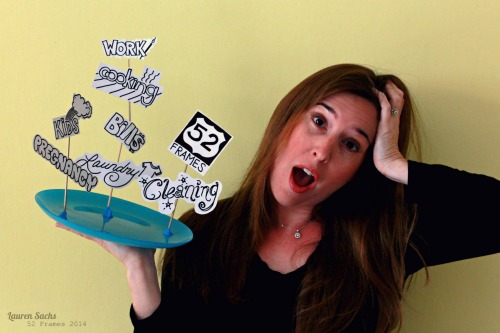
I never really had a paying job. In fact, I still don’t.
I started a new business and as anyone who has taken the leap and started a business knows, that doesn’t mean you’re getting paid or will get paid any time soon. For the first time in my life I have “job job”. And to tell you the truth, this is not how I imagined it would be.
This was my plan: Have a dream (check), work really hard to achieve it (check), be happy…
Now, I’m proud. I’m excited. I’m feeling engaged and doing something I love. The problem is that I’m having trouble finding the happy. I find myself with a full time job that seeps into my thoughts at nights, on weekends, on family vacations and during school plays.
To put things in perspective here is what my life was before this: I had a husband who I saw often. I had time to sit with him, talk to him and watch TV together. I used to be available for him. I also have 4 children for whom I was always available for as well. I played with them, picked them up from school and did homework with them. In fact, if I wasn’t home in the morning I was most probably at their school on the PTA or volunteering in the library (yes) and enjoying it. I volunteered at Saut Down Syndrome School. I was very good at staying in touch with my extended family. I was so good that I was at every family thing we had. Always!
When I started properly working on making my vision a reality, I worked all the time with the “excuse” of it being the beginning. I kept telling myself that it takes this much effort to make it happen. Then it didn’t let up. In fact it got worse.
I have always formed my opinions of working mothers from the cushiness of my ‘stay at home but work when I want to’ life. My opinion was that it was totally valid for a woman to stay home with her children and that it was, if not impossible, then unbelievably difficult to be fully available to your children and husband while working. Why men don’t have to think of being fully available to their wives and children is beyond me but we are being honest and this is what goes through my mind. It may be because while I don’t have to work for us to live he does, so the least I can do is be available when he does come home from work.
I never actually thought about this issue from the point of view of the working mother. Does every working mother constantly feel like she is failing her family because of her work? I do. Always. Every day. It’s gotten to a point that it puts a damper on any success I have in my work life because I know it came at the cost of time spent with my family.
It hasn’t gone unnoticed by my family either. They are missing me and feeling the difference in their day to day life. The upside is that I guess I know I’m wanted and needed. It does however makes the vision I had for my professional life blurry and a little less important every day.
What kills me more is that I don’t have to do this. I just want to. I am very proud of what I have accomplished and grateful for all the help that seems to have walked into my life to aid me in making this all work. At times I take it as a sign that I have to do this because of all the doors that opened up to me when I seriously started working on it.
It’s a strange feeling to be so proud of something I have accomplished but at the same time feel ashamed of the sacrifices I have made to get there.
It has been 6 months since this change in my life began and now I’m finding it harder and harder to come to terms with how much of my life it has taken up. I have a business I have committed time and money to, AND a family I feel I ‘m letting down daily.
So here’s my plan: Hire people who can take a load off of, so I can pick my kids up from school and see my husband while I still have enough energy to engage with them! It may be easier said than done but I will try and find a balance.
Is there such a thing as a balance between working and being a mother?
Does one have to suffer in order for the other to prosper?
Mostly, is it fair for me to do this at the expense of time spent with my children and husband, especially since I don’t have to, I just want to?
This is an original post for World Moms Blog by Mama B from Saudi Arabia. She can be found writing at her blog, Ya Maamaa.
Photo Credit to Lauren Sachs.

Mama B’s a young mother of four beautiful children who leave her speechless in both, good ways and bad. She has been married for 9 years and has lived in London twice in her life. The first time was before marriage (for 4 years) and then again after marriage and kid number 2 (for almost 2 years). She is settled now in Riyadh, Saudi Arabia (or as settled as one can be while renovating a house).
Mama B loves writing and has been doing it since she could pick up a crayon. Then, for reasons beyond her comprehension, she did not study to become a writer, but instead took graphic design courses. Mama B writes about the challenges of raising children in this world, as it is, who are happy, confident, self reliant and productive without driving them (or herself) insane in the process.
Mama B also sheds some light on the life of Saudi, Muslim children but does not claim to be the voice of all mothers or children in Saudi. Just her little "tribe." She has a huge, beautiful, loving family of brothers and sisters that make her feel like she wants to give her kids a huge, loving family of brothers and sisters, but then is snapped out of it by one of her three monkeys screaming “Ya Maamaa” (Ya being the arabic word for ‘hey’). You can find Mama B writing at her blog, Ya Maamaa . She's also on Twitter @YaMaamaa.
More Posts

by Purnima Ramakrishnan | Apr 8, 2014 | 2014, Brazil, Health, Humanitarian, Purnima, The Alchemist, World Moms Blog
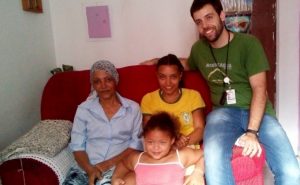
Raimunda with her family and Dr. Rodrigo D’Aurea from the Community Health Center
Raimunda is a 46-year-old mother to two beautiful daughters aged 19 years old and 7 years old. She sadly has lungs cancer, stage-4, has undergone chemotherapy, and now is in palliative care. Her family physician, Dr. Rodrigo D’Aurea took us to her house yesterday in a locality called Boa Vista in the suburbs of Sao Paulo which has a population of 20,000 people. She was diagnosed almost a year and half ago and she was already in stage-4. She has a very aggressive form of lung cancer. She used to smoke a long time ago, but has kicked the habit for more than a decade. Her husband used to contribute to the family’s upkeep until her elder daughter was 18 years old, but in the past year, he has stopped doing it. She has some pension from her retirement and she crochets for a living. You can see the beautiful white crochets folded on her couch.
Her doctor says, there are four things he has to take care of – firstly the physiological aspect of her body having cancer, secondly her psychological acceptance, how she deals with it, and accepts it emotionally, thirdly her dependents (here her daughters who will need to be adopted after her time), and fourthly he has also spoken to her priest and arranged for things. It made us a bit sad listening to it, this way. But hold on, there is more to this article. Melody, Julianna (our translator), and I accompanied Dr. Rodrigo D’Aurea and the health care worker on a work visit.
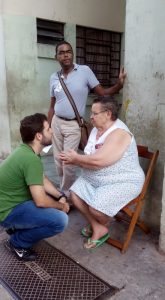
Dr. Rodrigo D’Aurea being greeted by yet one of his elderly patients on the street. The community health worker looking on.
I am here all the way from India as an International Reporting Project Fellow, reporting about the Public Health Center’s community visits. Here, a team consisting of a doctor, a nurse, two nursing assistants, a community health worker visits their patients in their assigned locality (Boa Vista here) and speak to the people and treat them. As we walked along the streets, I could see every resident saying “Ola” (Hi/Hello) and “Tudu Bem” (How are you) to Dr. Rodgrigo. It looked like he was a friend, a son, a brother to everyone whom we passed along in the streets.
The USB (Unidade Basica de Saude) which basically means Unit of Primary Health located in Jardin Boa Vista (Garden of Boa Vista) takes care of its 20,000 residents. It is almost like a hospital with about ten consultation rooms, a dentistry, Vaccination room, first aid and emergency room, a small nurses’ station, and some admin rooms. It is elegant, clean and hygienic. The doctors and health workers cater to not just the medical needs of the residents, but to their emotional and family needs.
Because here social problems have a big impact on the health problems of residents.

Dr. Rodrigo D’Aurea leaving for the day after giving us a tour of the clinic and the community
Dr. Rodrigo mentioned that he is more like a psychologist, counselor and a family doctor, rolled into one. He knows more about all the residents than anybody else. He feels morally responsible and I could feel the pride in his voice when he spoke about them.
He owns the hearts of the residents, is all I can say.
This Community Health initiative is a wonderful one and it is funded by the SUS. (Sistema Único de Saúde) which means the Unified Health System. It is Brazil’s publicly funded health care system. SUS was created after the Brazilian Constitution of 1988, which assured that health care is a “right of all and an obligation of the State”. Prior to that, only people who contributed to social security were able to receive health care. The creation of SUS was important in the sense that more than 80% of the Brazilian population depend on it to receive medical treatment.
These public health units focus mainly on the family health instead of the health of a single individual. It is interrelated. A family’s social, mental, and emotional well-being is directly related to the physical health of the individuals. It taps into different knowledge and practices from the perspective of a holistic and problem solving approach, enabling the creation of bonds of trust through ethics, commitment, and respect. They have different specialists visiting them often and on request. They also refer cases to different units like oncology, gynecology, and such for detailed assistance.
All the population of Brazil is covered to receive primary health care. It does not matter if you have insurance or not, if you are covered under your social security or not. Brazil is on the road to achieve a 100% health coverage. This is something the other developing nations in the world have to carefully watch and learn from.
This is an original post to World Moms Blog by Purnima Ramakrishnan, our Indian mother writing from Chennai, India. Her contributions to the World Moms Blog can be found here. She also rambles at The Alchemist’s Blog.
Photo credit to the author.
Purnima Ramakrishnan is a fellow of Journalism with the International Reporting Project (IRP), reporting from Sao Paulo, Brazil.
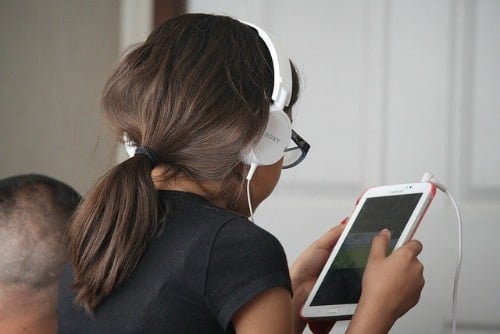
by Nancy Sumari | Apr 2, 2014 | Awareness, Food, Humanity, Nancy Sumari, Parenting, Uncategorized, World Moms Blog

Living in a developing country and being blessed enough to be able to work, provide for your family and get by, is considered lucky.
In Tanzania people are considered poor when their consumption is below than the national poverty line. Consumption includes all goods that are bought, as well as those produced and consumed at home. This includes food, household equipment, clothing, personal effects, personal care, recreation, cleaning, domestic services, contributions, fuel, petrol and soap.
Over the years, I have always had a sense of responsibility and felt the urgency to work towards bridging gaps in poverty, through advocating for education and engaging in activities, big and small, in sectors like health and social change in an attempt to bridge this gap.
After having my daughter, I understand the notion that every parent wants the very best for their child. It does not escape me how truly blessed we have been to be able to provide for her. What I’m struggling with now is excess, conservation as well as teaching her to understand that she really is no different than another young girl from the other side of town who does not have the luxury of being able to enjoy three healthy meals a day and who cannot afford to go to school. I hope to be able to awaken this sense of responsibility towards poverty and the gaps in society in my daughter.
One evening, I came home after a visit to a school in Dodoma, the country’s capital, where I had been working to raise funds for building a girls’ hostel. These students were going through horrors every day; from 16 kilometer walks to and from school, to living in deplorable conditions, to being subject to burglary and rape. It was really weighing in on me.
I walked in to find my younger brother and my daughter watching TV with the sound on really loud. She was playing a game on the iPad and lights were on all around the house. Excess. They had just had dinner and both seemed to be almost just laying there. or me that was a turning point. Things had to change. Scaling down was imminent.
High on our agenda these days is use of only what we need. Above all is practicing gratitude. When she is old enough to understand, I will introduce her to the reality of the way things are in the world.
It really strikes me though, time and time again, just how different lives are. Not to bite the hand that feeds me, but it seems almost unfair that some have so much while others have so little. What makes us special to be the “Haves” and them the “Have Nots”?
My struggle these days is just to try and get it.
What are your thoughts? How do you teach your kids about giving back?
This is an original post by Nancy Sumari from Tanzania. You can find more of her writing at Mama Zuri.
Photo credit to Wheeler Cowperthwaite























